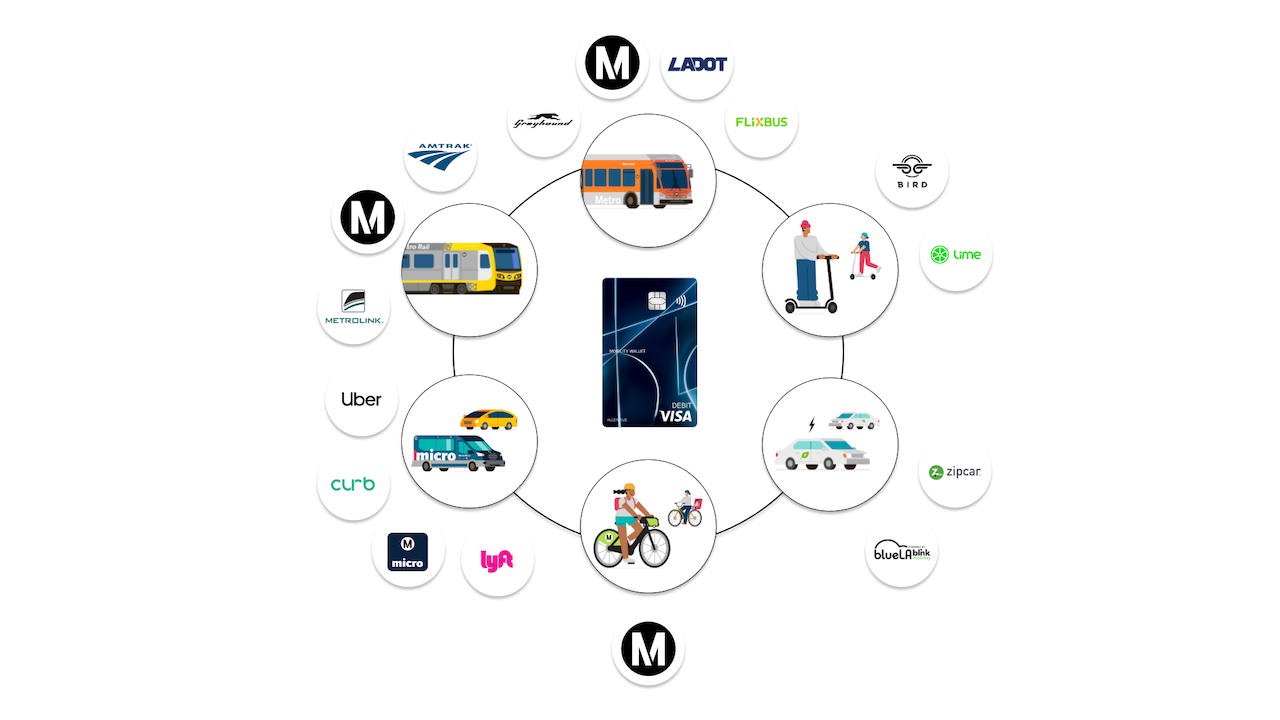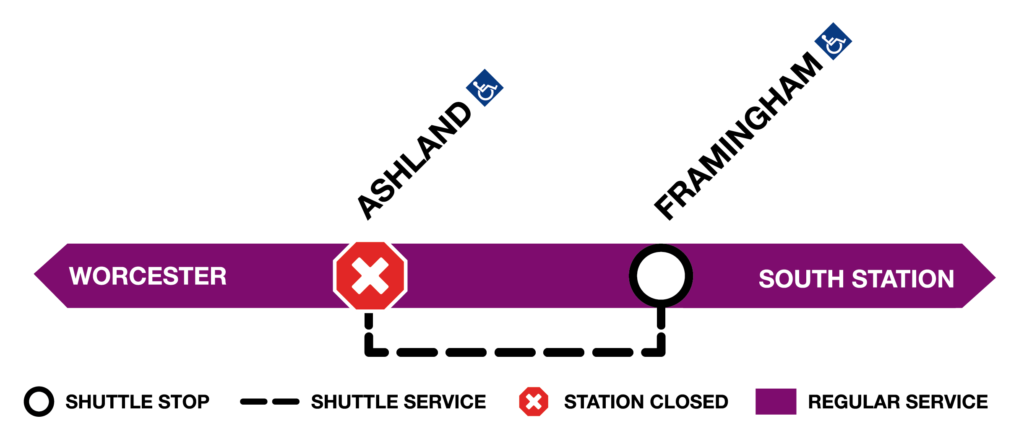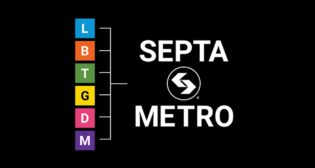
Transit Briefs: MBTA, Montreal REM, OC Transpo, LA Metro
Written by Carolina Worrell, Senior Editor
The Mobility Wallet allows LA Metro passengers to pay for all of the above transportation services.
The Massachusetts Bay Transportation Authority’s (MBTA) Ashland Station will receive $2.5 million in repairs and improvements. Also, Montreal’s Reseau express metropolitain (REM) shuts down on first official day of service; OC Transpo is still unclear as to when LRT will resume service; and LA Metro’s Mobility Wallet (MW) program provides a transportation solution for residents of South Los Angeles.
MBTA
The MBTA on July 31 announced that Ashland Station, on the Framingham/Worcester Commuter Rail Line, will receive $2.5 million in station repairs and improvements.
Work will include the complete restoration of the pedestrian overpass, including stairs and walkways; platform resurfacing and painting; repairs and improvements to the accessible platform; upgraded lighting; and installation of digital signage. To perform this critical improvement work, MBTA says Ashland Station will close on August 26 through fall 2023 with alternate shuttle bus service available for passengers.

“We’re pleased to deliver these critical improvements at Ashland Station, to ensure safe and accessible access for the Ashland community and our passengers when complete,” said MBTA General Manager and CEO Phillip Eng. “We’re investing in needed maintenance of our facilities as we work on the station’s pedestrian overpass, walkways, and platforms while also improving the customer experience with better lighting, new digital signs, and more. I’d like to thank our teams at the MBTA and Keolis for their work on this project; Senate President Spilka, Town Manager Herbert, Representative Lewis, other local leaders, stakeholders, community groups, and more for their strong advocacy and collaboration on both our upcoming work and alternate service plans; and the riders we serve for their patience as we complete these upgrades over the next few months.”
Montreal REM
A problem with the track on Montreal’s new light-rail transit system, REM, forced a shutdown on the system’s first full day of operation, according to a Canadian Press report.
REM officially launched Monday for paying customers after more than 120,000 people tried out the system for free over the weekend, according to the report.
A spokesperson for REM said “a switch problem on the tracks caused service to shut down at around 8 a.m. before it resumed at around 9:15 a.m.”
“There was a technical problem on a switch. It’s part of the tracks of the REM, it was a situation that needed a field team to repair it,” said Jean-Vincent Lacroix, adding that there was a partial closure of the 16.6-kilometer route starting at 8 a.m. At 8:30 a.m., service was “interrupted completely” for 45 minutes to allow for repairs.
According to the report, “Lacroix was unable to specify what caused the switch malfunction, but he preached patience and said operators are hoping to keep service interruptions to a minimum and make adjustments quickly.”
“These are situations that can happen,” Lacroix said, adding that “officials want to be ready for the resumption of the school year, when the number of users will rise.”
OC Transpo
As Ottawa heads into the third week of an LRT shutdown, OC Transpo is still “unclear when the trains will be running again” but “hopes it will be in another 12 days,” according to an Ottawa Citizen report.
According to the report, OC Transpo is “aiming for Wednesday to complete a risk assessment, followed by 10 days of work on adjusting the rails,” said City of Ottawa Transit Services General Manager Renée Amilcar. She said she’s “hopeful the risk assessment will be completed by Wednesday but couldn’t offer guarantees.”
The $2.1-billion Confederation Line has been shut down since July 17 after excess grease was found on the axle of one light rail vehicle during a routine inspection.
According to the Ottaza Citizen report, a limited return to service had been planned for Monday, with eight single-car trains running from Blair Station to Tunney’s Pasture Station. But the Rideau Transit Group (RTG), which maintains the system, and Alstom, which manufactured the trains, said “more work has to be done to prevent contact between the train wheel and the restraining rail on the track, particularly on 16 curved sections of track.”
The risk assessment to be conducted in the next few days will “provide assurance that the restraining rail will still be able to prevent a derailment,” said Amilcar.
While this work is being done, RTG is replacing the hub assemblies on all the light rail vehicles in its fleet. So far, the assemblies have been replaced on 12 vehicles, she said.
Meanwhile, according to the Ottawa Citizen report, RTG has hired design, engineering and consultancy firm Atkins, affiliated with Montreal-based SNC-Lavlin, which is expanding the Trillium Line. “The terms of reference of the contract are still being worked out,” said RTG CEO Nicolas Truchon.
LA Metro
LA Metro’s MW pilot program, oriented to the community of South Los Angeles, provides an all-in-one-way to pay for multiple modes of transportation. The program—the largest of its kind in the nation—is administered by the transit agency and the Los Angeles Department of Transportation (LADOT).

According to LA Metro, the MW is a prepaid debit card that is loaded with $150 per month for 12 months (May 2023 – April 2024) that allows one person, or several members of the same household, to pay for public, including buses, trains, bike shares, and Metro Micro vans; regional transportation, like Metrolink and Amtrak; private buses, such as Greyhound and Flix Bus, and shared rides, like Uber and Lyft. The card can also be used to pay for trips on the FlyAway, rent scooters, and pay for services or products in bicycle shops.
Since its launch in May 2023, LA Metro says more than 1,000 debit cards have been distributed to low-income people. Nine hundred were selected through the online application process while 100 were signed up during eight in-person bilingual Mobility Wallet workshops held in conjunction with community-based organizations, said LA Metro Senior Director of Strategic Innovation Avital Shavit.
From May 1 to July 18, 9,485 transactions have been completed using MWs. When participants receive the card, it must be activated before use. If a participant doesn’t spend the entire $150 balance within a month, the funds roll over to the next month. Participants must be at least 18 years old to qualify in addition to meeting eligibility requirements, such as self-certifying their income and living in one of 10 qualifying South LA zip-codes.
“The geographic area to qualify has been identified as a federal transit empowerment zone,” said Shavit. “This area has been identified as a place that needs additional transportation. It also concentrates a high percentage of low-income people who are transit dependent.”
The areas chosen for the MW are home to a population of more than 370,000 people with 29% of households below the poverty level, according to transportation authorities. More than 6% of households do not own a vehicle and 30% only have one car at home. The majority of the residents are people of color, with two-thirds Hispanic and a quarter African American.

The program, which is a collaboration with the City of Los Angeles and the California Department of Transportation’s California Integrated Travel Project (Cal-ITP), has a $13.8 million grant from the California Air Resources Board (CARB) and $2 million in funding from LADOT. The state has also awarded a grant to the University of California, Los Angeles (UCLA) and the University of California, Davis (UCD), two entities that are helping Metro and LADOT evaluate the pilot program.
“We are looking at ways to see how we can expand the program,” said Shavit. “MW has been identified as a project that could be supported throughout LA County in preparation for the 2028 Olympics.”
The second phase of the program is expected to launch this winter.



